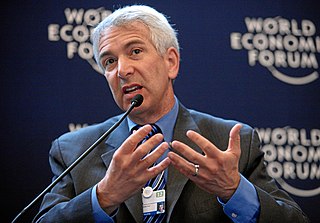A Quote by Van Jones
The question is: do we pay a little bit more now? Or do we pay a whole lot later? For the equivalent of a postage stamp a day for each American, we can put a price on carbon today that will send a signal to private capital to invest in the clean technologies of tomorrow. Taking a vast portfolio of new energy solutions to scale will ultimately drive down costs through competition.
Quote Topics
American
Bit
Capital
Carbon
Clean
Competition
Costs
Day
Down
Drive
Each
Energy
Equivalent
Invest
Later
Little
Little Bit
Lot
More
New
New Energy
Now
Pay
Portfolio
Postage
Price
Private
Put
Question
Scale
Send
Signal
Solutions
Stamp
Taking
Technologies
Through
Today
Tomorrow
Ultimately
Vast
Whole
Will
Related Quotes
We will pay for this [climate change] one way or another. We will pay to reduce greenhouse-gas emissions today and we'll have to take an enormous hit of some kind. Or we will pay the price later in military terms. And that will involve human lives. There will be a human toll. There is no way out of this that does not have real costs attached to it.
Setting an aggressive enough carbon-reduction goal will result in an appropriate price for carbon and will help many a renewable technology. Consumer education will help. Most importantly, though, will be the continually declining cost trajectory of the real breakthrough in clean-technology costs driven by research and innovation. In the end, private capital is the real barometer of change.
The government also has to get the public rules right. That means putting a price on carbon, so the cleaner forms of energy become more competitive. As soon as that happens, a tidal wave of new capital, innovation and entrepreneurship will flood into the clean energy space - creating new jobs and opportunities for Americans of all walks of life. We did that for the internet, with public investments in the basic system through the Pentagon, followed by rules that encouraged innovation and competition. And that is why the internet took off in the United States first.
We call it EPCOT, spelled E-P-C-O-T: Experimental Prototype Community of Tomorrow. Here it is in larger scale. EPCOT will take its cue from the new ideas and new technologies that are now emerging from the creative centers of American industry. It will be a community of tomorrow that will never be completed, but will always be introducing and testing and demonstrating new materials and systems. And EPCOT will always be a showcase to the world for the ingenuity and imagination of American free enterprise.
The goal of a private company is, first, zero to one. Get past the product market fit, figure out whether people actually care about what you're trying to build and someone will pay you money for that. That's the zero to one problem. So scaling, one through N, is figuring out can you do that at scale and how big is the scale. And when people pay you more than what it costs for you to make it, does that equation end up leaving you with money left over, i.e. profits.
You will never have this day with your children again. Tomorrow they will be a little bigger then they are today. This day is a gift. Breathe and notice. Smell and touch them; study their faces and little feet and pay attention. Relish the charms of the present. Enjoy today mama. It will be over before you know it.
One of the biggest reasons for higher medical costs is that somebody else is paying those costs, whether an insurance company or the government. What is the politicians' answer? To have more costs paid by insurance companies and the government. ... [H]aving someone else pay for medical care virtually guarantees that a lot more of it will be used. Nothing would lower costs more than having each patient pay those costs. And nothing is less likely to happen.
We believe that part of the answer lies in pricing energy on the basis of its full costs to society. One reason we use energy so lavishly today is that the price of energy does not include all of the social costs of producing it. The costs incurred in protecting the environment and the health and safety of workers, for example, are part of the real costs of producing energy-but they are not now all included in the price of the product.
We must recognize that the goal of a cleaner environment will not be achieved by rhetoric or moral dedication alone. It will not be cheap or easy and the costs will have to be borne by each citizen, consumer and taxpayer. How clean is clean enough can only be answered in terms of how much we are willing to pay and how soon we seek success... It is simplistic to seek ecological perfection at the cost of bankrupting the very tax-paying enterprises which must pay for the social advances we seek.



































